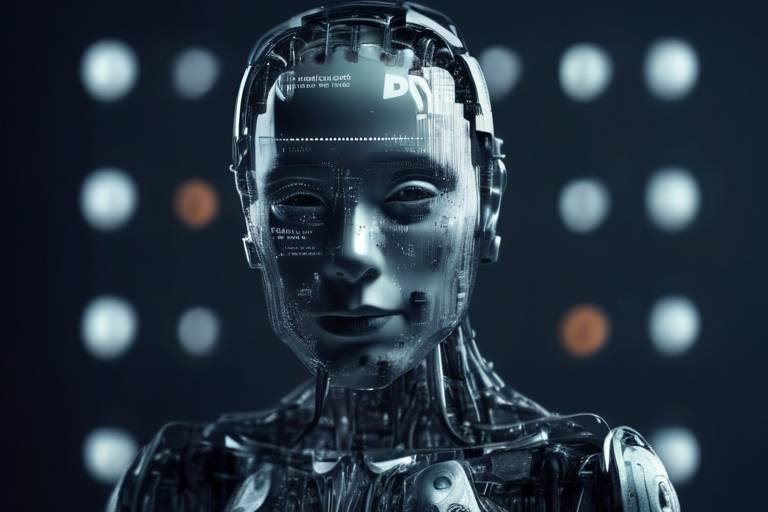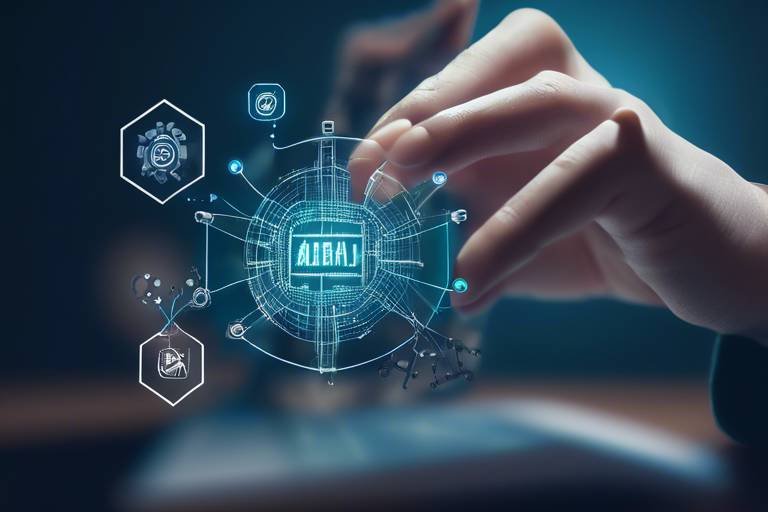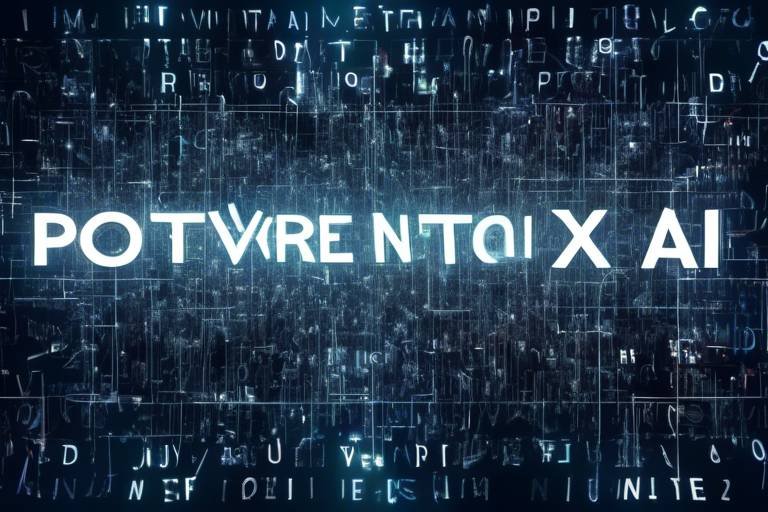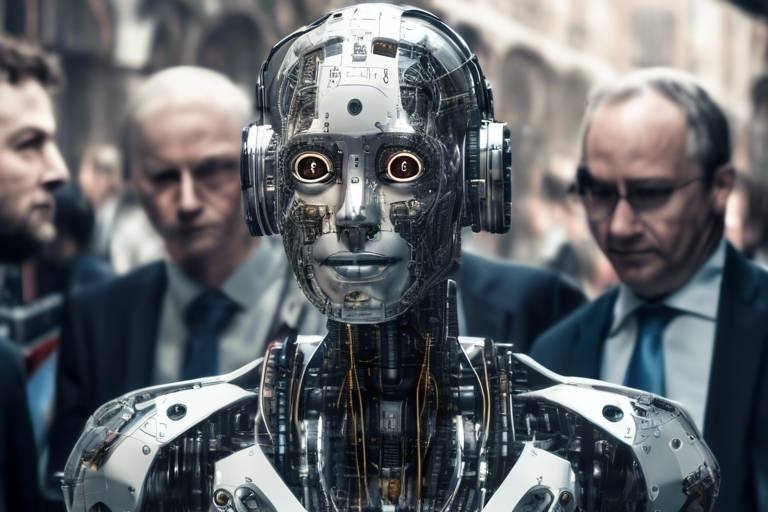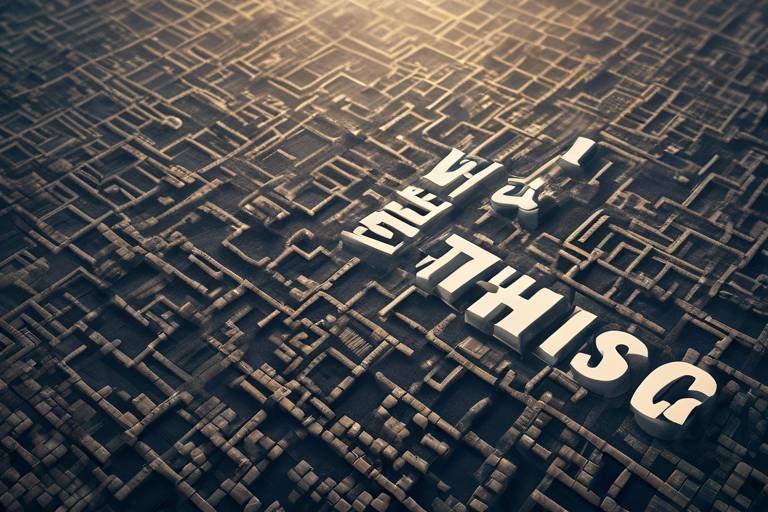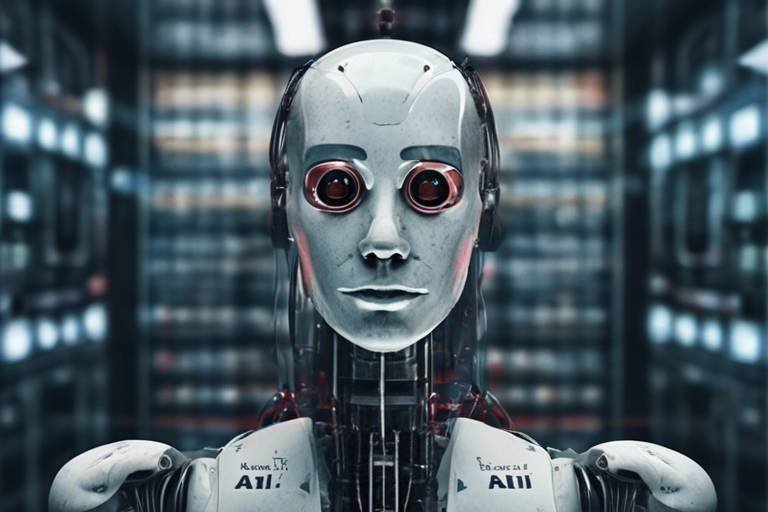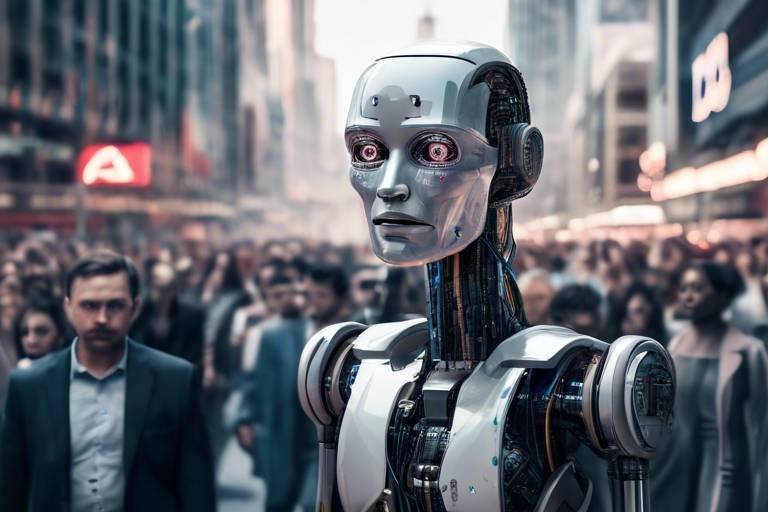Can AI Be Ethically Neutral?
In an age where technology intertwines with our daily lives, the question of whether artificial intelligence (AI) can be ethically neutral has become a hot topic of debate. Many of us rely on AI for everything from social media recommendations to healthcare diagnostics, but can these systems operate without bias? The answer is complex and layered, much like the algorithms that power them. To understand this, we must first delve into the nature of AI and the ethical frameworks that govern its development.
At its core, AI is a set of algorithms designed to replicate human decision-making processes. But unlike humans, who have the capacity for moral reasoning, AI lacks inherent ethical understanding. This raises a critical question: if AI is devoid of personal beliefs or morals, can it truly be considered ethically neutral? In reality, AI systems are shaped by the data they are trained on, and this data often reflects existing human biases. Thus, while AI itself may not possess ethics, the impact of its decisions can have profound moral implications.
Moreover, the ethical neutrality of AI is further complicated by the intentions of its creators. Developers and organizations wield significant influence over how AI operates, often embedding their own values and biases into the technology. This can lead to scenarios where AI systems inadvertently perpetuate stereotypes or make decisions that favor certain groups over others. For instance, facial recognition technology has been criticized for its disproportionate inaccuracies with people of color, highlighting a glaring ethical concern that cannot be overlooked.
To illustrate the potential for bias in AI, consider the following table that outlines various sectors impacted by AI algorithms:
| Sector | Potential Biases | Ethical Implications |
|---|---|---|
| Healthcare | Underrepresentation of minorities in training data | Misdiagnosis or unequal treatment |
| Criminal Justice | Racial biases in predictive policing | Disproportionate targeting of specific communities |
| Finance | Credit scoring algorithms favoring certain demographics | Perpetuation of economic inequality |
As we navigate the complexities of AI ethics, it becomes evident that achieving true ethical neutrality is an uphill battle. Different ethical frameworks can provide guidance in addressing these dilemmas. For instance, utilitarianism emphasizes the greatest good for the greatest number, while deontology focuses on adherence to rules and duties. Meanwhile, virtue ethics encourages the development of moral character in AI systems. Each framework offers valuable insights, but none can fully resolve the inherent biases that may be coded into AI.
The impact of AI on society is another critical aspect to consider. On one hand, AI can enhance efficiency, improve healthcare outcomes, and even foster innovation. On the other hand, the potential for job displacement, privacy invasion, and social isolation raises ethical alarms. As AI becomes more integrated into our lives, we must remain vigilant about its implications and strive for a balance that prioritizes human well-being.
Accountability is a vital component of ethical AI governance. If an AI system makes a decision that leads to harm, who is responsible? Is it the developer, the organization using the AI, or the AI itself? These questions highlight the challenges in establishing accountability in a world increasingly reliant on complex AI systems. Without clear lines of responsibility, the ethical landscape becomes murky, leaving individuals and communities vulnerable to the consequences of AI decisions.
Finally, it's essential to recognize that AI ethics is a global concern. Different cultures and countries approach ethical standards in diverse ways, influenced by their unique values and societal norms. International collaboration is crucial in establishing a cohesive framework that addresses the ethical implications of AI across borders. By sharing insights and best practices, we can work towards a future where AI serves humanity positively and equitably.
- Can AI be truly unbiased? No, AI reflects the biases present in its training data and the intentions of its developers.
- What are the consequences of biased AI? Biased AI can lead to unfair treatment in various sectors, including healthcare, finance, and criminal justice.
- How can we ensure ethical AI development? By adopting diverse ethical frameworks and promoting accountability among developers and organizations.
- Is there a global consensus on AI ethics? No, different cultures have varying approaches to AI ethics, highlighting the need for international collaboration.

The Nature of AI and Ethics
Understanding the intersection of artificial intelligence (AI) and ethics is like trying to solve a complex puzzle where each piece represents a different facet of technology and morality. At its core, AI refers to systems and machines designed to mimic human intelligence, enabling them to perform tasks ranging from simple calculations to complex decision-making. But as these systems become more integrated into our lives, the ethical implications of their use become increasingly critical.
Ethics, on the other hand, is the branch of philosophy that deals with questions about what is morally right and wrong. When we talk about AI ethics, we are essentially asking: Can machines make decisions that are not only intelligent but also ethical? This question is particularly pressing given the potential of AI to influence a wide array of sectors, including healthcare, finance, law enforcement, and even social interactions.
To grasp the nature of AI and ethics, we must first recognize that AI is not inherently good or bad; rather, it reflects the values and biases of its creators. For instance, if a team of developers prioritizes efficiency over fairness, the resulting AI could perpetuate existing inequalities. This is why understanding the ethical frameworks that guide AI development is essential. There are several key principles that often come into play:
- Fairness: Ensuring that AI systems treat all individuals equitably, without discrimination.
- Transparency: Making AI decision-making processes understandable to users and stakeholders.
- Accountability: Establishing who is responsible for the decisions made by AI systems.
- Privacy: Protecting individuals' personal data in AI applications.
These principles serve as a foundation for discussions about how AI can be designed and deployed responsibly. However, the challenge lies in the fact that ethical considerations can vary significantly across cultures and contexts. For instance, what is considered ethical in one society might be viewed differently in another. This cultural diversity adds another layer of complexity to the dialogue surrounding AI ethics.
Moreover, as AI technology evolves, so too must our understanding of its ethical implications. New advancements bring new ethical dilemmas. For example, as AI begins to incorporate more autonomous decision-making capabilities, questions arise about the moral status of these systems. Are they merely tools, or do they possess some form of agency? This philosophical debate is crucial as we navigate the future of AI.
In conclusion, the nature of AI and ethics is a dynamic and multifaceted issue that requires ongoing dialogue and reflection. As we continue to develop and integrate AI into our daily lives, it is imperative that we remain vigilant about the ethical implications of these technologies. By fostering a culture of ethical awareness, we can strive to ensure that AI serves humanity in a way that is not only intelligent but also just and equitable.

Historical Context of AI Development
The journey of artificial intelligence (AI) is as fascinating as it is complex, rooted in a rich tapestry of ideas and innovations that span decades. From the early days of computation to the sophisticated neural networks we see today, understanding this evolution is crucial for grasping the ethical implications that accompany AI technology. The term "artificial intelligence" was first coined in 1956 at a conference at Dartmouth College, where pioneers like John McCarthy and Marvin Minsky envisioned machines that could mimic human thought processes. This marked the beginning of a new era, but it also set the stage for ongoing debates about the moral responsibilities tied to these advancements.
Throughout the 1960s and 1970s, significant milestones occurred, including the development of expert systems that could solve specific problems within defined domains. These systems, while groundbreaking, also revealed the limitations of AI at the time, leading to what is known as the AI winter—a period of reduced funding and interest in the field. However, the 1980s saw a revival, fueled by advances in machine learning and the increasing availability of computational power. During this time, researchers began to explore the ethical ramifications of AI more seriously, recognizing that the technology could impact various aspects of society.
Fast forward to the turn of the millennium, and we witnessed a renaissance in AI development, largely driven by the rise of the internet and big data. Companies like Google and IBM began investing heavily in AI research, leading to breakthroughs in natural language processing and computer vision. Yet, with these advancements came a new wave of ethical questions. For instance, how do we ensure that AI systems are not only effective but also fair? The introduction of algorithms capable of making life-altering decisions—such as in healthcare, criminal justice, and hiring—has intensified discussions about accountability and bias.
In recent years, the ethical considerations surrounding AI have gained traction globally. Various organizations and governments have begun to draft guidelines and frameworks aimed at ensuring that AI technologies are developed responsibly. The European Union, for example, has proposed regulations to govern AI deployment, emphasizing the importance of transparency and human oversight. This reflects a growing recognition that as AI systems become more integrated into our daily lives, the implications of their decisions can have profound consequences.
To summarize the historical context of AI development, we can highlight a few key phases:
| Decade | Key Developments | Ethical Considerations |
|---|---|---|
| 1950s | Coining of the term "AI"; Dartmouth Conference | Initial discussions on machine intelligence |
| 1960s-70s | Development of expert systems | Limitations of AI; the AI winter |
| 1980s | Revival of AI interest; machine learning | Emerging ethical questions |
| 2000s | Rise of big data; advancements in NLP and vision | Bias and accountability in AI systems |
| 2020s | Global regulations and ethical frameworks | Focus on transparency and human oversight |
As we delve deeper into the ethical implications of AI, it’s essential to recognize that the technology is not just a collection of algorithms; it’s a reflection of our values and decisions as a society. The historical context provides a backdrop for understanding why these discussions are more relevant now than ever. With every advancement, we must ask ourselves: Are we prepared to handle the consequences of the technologies we create?
- What is artificial intelligence? AI refers to the simulation of human intelligence in machines programmed to think and learn.
- Why is AI ethics important? AI ethics is crucial to ensure that AI technologies are developed and used responsibly, minimizing harm and promoting fairness.
- How can we address bias in AI? Addressing bias involves using diverse training data, implementing transparency in algorithms, and continuously monitoring AI systems for fairness.

Bias in AI Algorithms
Bias in AI algorithms is a significant concern that has garnered attention from researchers, developers, and ethicists alike. When we think about artificial intelligence, we often envision a world where machines make decisions based on pure logic and data. However, the reality is much more complicated. AI systems are designed and trained by humans, and as such, they can inherit the biases—conscious or unconscious—of their creators. This raises an essential question: can we truly trust AI to make fair and impartial decisions?
To understand the implications of bias in AI, it’s crucial to recognize how it manifests. Bias can creep into AI algorithms through various channels, including:
- Data Selection: The data used to train AI models can be skewed or unrepresentative of the broader population. For instance, if an AI system is trained predominantly on data from one demographic, it may not perform well for others.
- Labeling Bias: The way data is labeled can also introduce bias. If human annotators have preconceived notions or stereotypes, these can influence the way data is categorized, leading to skewed outcomes.
- Algorithm Design: The algorithms themselves may be designed in ways that favor certain outcomes over others, often reflecting the biases of the developers.
The consequences of biased AI algorithms can be severe, affecting numerous aspects of life. For example, biased algorithms in hiring processes can lead to discrimination against minority candidates, while biased facial recognition systems can misidentify individuals, leading to wrongful accusations or privacy violations. The implications stretch across sectors, including healthcare, law enforcement, finance, and more. As we integrate AI into critical decision-making processes, the stakes become even higher.
Moreover, the lack of transparency in many AI systems complicates the issue. Many algorithms operate as "black boxes," meaning their decision-making processes are not easily understood by humans. This opacity makes it challenging to identify and rectify biases when they occur. So, how do we combat this problem? One approach is to implement rigorous testing and auditing of AI systems to ensure they are fair and unbiased. This involves not only examining the data and algorithms but also considering the societal context in which these systems operate.
In recent years, there has been a growing movement towards responsible AI development, emphasizing the need for ethical guidelines and frameworks that prioritize fairness and accountability. Companies and organizations are increasingly recognizing that addressing bias is not just a technical challenge but a moral imperative. After all, the goal of AI should be to enhance human capabilities and contribute positively to society, rather than perpetuating existing inequalities.
In conclusion, the issue of bias in AI algorithms is complex and multifaceted. It requires a collaborative effort from technologists, ethicists, policymakers, and society at large to ensure that AI serves all individuals equitably. By acknowledging the potential for bias and actively working to mitigate it, we can move towards a future where AI truly reflects our shared values and aspirations.
Q1: What is bias in AI?
A1: Bias in AI refers to systematic and unfair discrimination in the outcomes produced by AI systems, often arising from biased data, labeling, or algorithm design.
Q2: How does bias in AI affect decision-making?
A2: Biased AI can lead to unfair treatment of individuals or groups, impacting areas such as hiring, lending, law enforcement, and healthcare.
Q3: What can be done to reduce bias in AI?
A3: Solutions include diverse data collection, transparent algorithm design, regular audits, and the establishment of ethical guidelines for AI development.

Ethical Frameworks for AI
As we dive into the intricate world of artificial intelligence, it becomes increasingly evident that the ethical frameworks guiding its development and deployment are not just academic exercises; they are essential blueprints that shape our interaction with technology. In a world where AI systems influence everything from healthcare decisions to hiring practices, understanding these frameworks is crucial. But what exactly do we mean by ethical frameworks? Simply put, they are structured methods of thinking about morality and ethical behavior, providing a foundation for evaluating the implications of AI.
Among the most prominent ethical frameworks are utilitarianism, deontology, and virtue ethics. Each of these frameworks offers a unique lens through which we can examine the ethical dilemmas posed by AI. Utilitarianism, for instance, emphasizes the greatest good for the greatest number. When applied to AI, this framework encourages developers to create systems that maximize overall happiness and minimize harm. However, this raises a critical question: can we truly quantify happiness and harm in a way that is fair to all stakeholders?
On the other hand, deontology focuses on the morality of actions themselves rather than their consequences. This framework posits that certain actions are inherently right or wrong, regardless of their outcomes. For AI developers, this means that the processes and methodologies used in creating AI systems must adhere to established moral principles. For example, a deontological approach would demand transparency and fairness in AI algorithms, ensuring that they do not discriminate against any particular group.
Virtue ethics introduces a more character-based perspective, emphasizing the importance of the developer's intentions and moral character. This framework challenges us to consider what kind of virtues should guide AI development. Should we prioritize empathy, honesty, or innovation? In a field that evolves so rapidly, fostering a culture of ethical responsibility among AI practitioners is vital. It encourages a mindset where ethical considerations are not just an afterthought but a core part of the development process.
To illustrate how these frameworks can be applied, consider the following table that compares the three approaches in the context of AI:
| Framework | Focus | Implication for AI |
|---|---|---|
| Utilitarianism | Consequences | Maximize overall benefit and minimize harm. |
| Deontology | Actions | Adhere to moral principles and ensure fairness. |
| Virtue Ethics | Character | Foster ethical virtues among developers. |
Ultimately, the integration of these ethical frameworks into AI development is not just a theoretical exercise; it has real-world implications that affect millions of lives. As we navigate this complex landscape, it's essential for stakeholders—developers, policymakers, and users alike—to engage in ongoing discussions about the moral dimensions of AI. This collaborative approach can help ensure that AI systems are not only effective but also aligned with our shared values and ethical standards.
- What is the importance of ethical frameworks in AI? Ethical frameworks guide the development of AI by ensuring that technologies are aligned with moral values and societal norms.
- How do different ethical frameworks influence AI development? Each framework offers unique perspectives on what constitutes ethical behavior in AI, affecting decision-making processes and outcomes.
- Can AI be developed without ethical considerations? Developing AI without ethical considerations can lead to biased, harmful, or unjust outcomes, making ethical frameworks essential.

Impact of AI on Society
The integration of artificial intelligence into our daily lives has been nothing short of revolutionary. From the way we communicate to how we work, AI is reshaping our world in profound ways. But have you ever stopped to think about the implications of this technology? It's not just about efficiency or convenience; it's about how AI affects our societal structures, relationships, and even our individual identities.
On one hand, AI brings remarkable benefits. For instance, in healthcare, AI algorithms can analyze vast amounts of data to assist doctors in diagnosing diseases faster and more accurately. Imagine a world where your doctor can predict your health risks before they even manifest! This not only improves patient outcomes but also reduces the burden on healthcare systems. However, with these advancements come significant challenges. The reliance on AI in critical areas raises questions about privacy and security. How much of our personal data are we willing to share for the sake of convenience?
Moreover, the impact of AI on employment is another critical concern. While AI can automate mundane tasks, freeing up human workers for more creative and strategic roles, it also poses a threat to job security. Many fear that as machines become more capable, they will replace human jobs, leading to widespread unemployment. A study by McKinsey estimates that by 2030, up to 30% of the global workforce could be displaced by automation. This statistic is alarming and raises the question: how do we prepare our workforce for this impending shift?
Furthermore, AI's influence on social interactions cannot be overlooked. With the rise of social media algorithms, our online experiences are increasingly curated by AI, shaping our opinions and beliefs. This can lead to the creation of echo chambers, where individuals are only exposed to information that aligns with their existing views. The implications for democracy and public discourse are significant. Are we losing the ability to engage with diverse perspectives?
To illustrate the multifaceted impact of AI on society, consider the following table that summarizes both the positive and negative effects:
| Positive Impacts | Negative Impacts |
|---|---|
| Improved healthcare outcomes | Job displacement |
| Enhanced productivity | Privacy concerns |
| Personalized learning experiences | Manipulation of information |
| Increased accessibility | Widening inequality |
As we navigate this new landscape, it’s crucial to engage in discussions about the ethical implications of AI. We must ask ourselves: how do we ensure that AI serves the public good? What measures can be implemented to mitigate the risks associated with its use? The answers to these questions will shape the future of our society and determine whether AI will be a tool for progress or a source of division.
In summary, the impact of AI on society is complex and multifaceted. While it offers incredible opportunities for advancement, it also presents significant challenges that we must address. As we stand on the brink of this technological revolution, let’s strive for a future where AI enhances our lives without compromising our values or our humanity.
- What are the main benefits of AI in society? AI can improve efficiency, enhance healthcare, and provide personalized experiences across various sectors.
- How does AI affect employment? While AI can create new job opportunities, it also poses a risk of job displacement in certain industries.
- What ethical concerns are associated with AI? Key concerns include privacy, accountability, and the potential for bias in AI algorithms.
- How can society prepare for the impact of AI? Education and reskilling programs are essential to equip the workforce with the skills needed in an AI-driven world.

Accountability in AI Systems
When we talk about , we're diving into a pool of ethical dilemmas that can sometimes feel like navigating a maze. Who is responsible when an AI makes a decision that leads to negative consequences? Is it the developers, the users, or perhaps the very algorithms themselves? The complexity of AI systems often obscures clear lines of accountability, making it crucial to address these questions head-on.
To understand accountability, we first need to look at how AI operates. Most AI systems learn from vast amounts of data, processing information to make predictions or decisions. However, this learning process can sometimes lead to unexpected outcomes. For instance, if an AI system used in hiring decisions discriminates against certain candidates, pinpointing responsibility becomes a tangled issue. Are the developers at fault for not foreseeing the bias in the data? Or is it the organization that deployed the AI without proper oversight? This ambiguity raises important questions about moral responsibility and the need for transparent processes.
In many cases, accountability can be divided into several key areas:
- Developers: Those who create AI algorithms must ensure that ethical considerations are integrated into their design.
- Organizations: Companies that implement AI systems need to establish guidelines and frameworks for responsible use.
- Regulators: Governments and regulatory bodies should enforce laws that hold parties accountable for AI's impact on society.
Despite these categories, the challenge remains: how do we enforce accountability in practice? One approach is to implement auditing mechanisms for AI systems. Regular audits can help identify biases and ensure that AI operates within ethical boundaries. Additionally, creating a framework for accountability might involve setting up a system of checks and balances, where multiple stakeholders are involved in decision-making processes. This could mean involving ethicists, legal experts, and community representatives to provide a holistic view of AI's implications.
Moreover, the advent of explainable AI (XAI) is a promising development in this realm. XAI aims to make AI decisions more transparent, allowing stakeholders to understand how and why decisions are made. By shedding light on the decision-making process, organizations can better assess accountability and take corrective actions when necessary. This transparency not only fosters trust but also empowers users to question and challenge AI outcomes, creating a more balanced power dynamic.
As we move forward, it will be essential to establish clear guidelines that define accountability in AI systems. This includes developing comprehensive policies that address ethical considerations and outline responsibilities for all parties involved. Without such frameworks, we risk a future where AI systems operate without oversight, leading to potentially harmful consequences.
- Who is responsible if an AI system causes harm?
- Responsibility can fall on multiple parties, including developers, organizations, and regulatory bodies, depending on the situation.
- What is explainable AI?
- Explainable AI refers to AI systems designed to provide clear and understandable explanations for their decisions, enhancing transparency and accountability.
- How can organizations ensure accountability in AI?
- Organizations can implement auditing processes, involve diverse stakeholders in decision-making, and establish clear ethical guidelines for AI use.

Global Perspectives on AI Ethics
When we talk about AI ethics, it's crucial to recognize that this isn't just a local issue; it's a global one. Different countries and cultures have their own unique perspectives on what ethical AI means and how it should be implemented. For instance, in the United States, the focus often leans towards innovation and economic growth, while in European countries, there's a stronger emphasis on privacy and data protection. This divergence can lead to a patchwork of regulations and ethical standards that complicate the global landscape of AI development.
In Asia, particularly in nations like China and Japan, the approach to AI ethics is significantly influenced by cultural values and government policies. China, for instance, has been rapidly advancing its AI capabilities, often prioritizing state interests and societal stability over individual rights. This raises questions about the ethical implications of AI systems that are designed to monitor and control populations. On the other hand, Japan's approach tends to embrace a more human-centric perspective, focusing on how AI can enhance human capabilities rather than replace them.
Moreover, the Global South presents its own challenges and perspectives regarding AI ethics. Many developing countries are concerned about the potential for AI to exacerbate existing inequalities. They often lack the resources to implement ethical guidelines effectively, leading to fears that AI could reinforce systemic biases rather than alleviate them. Therefore, it's essential for global dialogues to include voices from these regions to ensure that AI development is inclusive and equitable.
To further illustrate these varying perspectives, consider the following table that summarizes some key differences in AI ethics across different regions:
| Region | Focus Areas | Key Concerns |
|---|---|---|
| United States | Innovation, Economic Growth | Data Privacy, Bias in Algorithms |
| Europe | Data Protection, Human Rights | Surveillance, Accountability |
| China | State Control, Stability | Individual Rights, Surveillance |
| Japan | Human-Centric AI | Job Displacement, Ethical Use |
| Global South | Equity, Access | Exacerbation of Inequality |
As we navigate this complex landscape, it's essential to foster international collaboration. By sharing insights and best practices, countries can work together to develop a unified approach to AI ethics that respects cultural differences while promoting shared values. This collaboration could take the form of global summits, where policymakers, technologists, and ethicists come together to discuss and create frameworks that guide the ethical development and deployment of AI technologies.
In conclusion, understanding the global perspectives on AI ethics is not just an academic exercise; it’s a necessity for creating AI systems that are fair, just, and beneficial for all. As AI continues to evolve, so too must our approach to its ethical implications, ensuring that we remain vigilant and proactive in addressing the challenges that lie ahead.
- What is AI ethics? AI ethics refers to the moral implications and responsibilities associated with the development and use of artificial intelligence.
- Why is a global perspective on AI ethics important? Different cultural and regional values influence how AI is developed and used, making a global dialogue essential for creating equitable standards.
- How can countries collaborate on AI ethics? Through international summits, shared research, and cooperative policy-making, countries can develop unified ethical frameworks for AI.

Future Directions for Ethical AI
The future of ethical AI is not just a distant concept; it's a vibrant and evolving landscape that demands our attention and action. As technology continues to advance at a breakneck pace, we must consider how we can harness these innovations responsibly. Imagine a world where AI not only enhances our lives but does so without compromising our ethical standards. Sounds ideal, right? But how do we get there?
One of the most promising directions for ethical AI is the development of transparent algorithms. Transparency is crucial because it allows users to understand how decisions are made. When algorithms operate like a black box, it becomes nearly impossible to hold them accountable for their actions. By fostering a culture of openness, we can demystify AI systems, making it easier to identify biases and rectify them. This transparency can be achieved through rigorous testing and continuous monitoring of AI systems, ensuring they align with ethical guidelines.
Moreover, collaboration between technologists, ethicists, and policymakers is essential. We need a multidisciplinary approach that combines expertise from various fields to create comprehensive ethical frameworks. For instance, incorporating insights from sociology can help us understand the societal impacts of AI, while legal experts can ensure that regulations keep pace with technological advancements. This collaboration can take various forms, such as:
- Joint workshops and conferences to discuss ethical implications
- Interdisciplinary research projects focusing on ethical AI
- Public forums to engage communities in discussions about AI ethics
Another critical aspect of the future of ethical AI is the emphasis on education and awareness. As AI systems become more integrated into our daily lives, it is crucial for everyone, from developers to end-users, to understand the ethical implications of these technologies. Educational institutions should incorporate AI ethics into their curricula, ensuring that the next generation of technologists is well-equipped to navigate these challenges. Additionally, public awareness campaigns can help demystify AI for the general populace, promoting informed discussions about its ethical use.
Furthermore, we can expect to see the emergence of regulatory frameworks that specifically address AI ethics. As governments and organizations recognize the potential risks associated with AI, there will likely be a push for laws and guidelines that govern its development and deployment. These regulations can help standardize ethical practices across industries, ensuring that AI serves the greater good while minimizing harm. However, it’s essential that these frameworks are flexible enough to adapt to the rapid pace of technological change.
Lastly, the integration of ethical AI technologies into existing systems will be a game-changer. For example, using AI to detect and mitigate bias in hiring processes or employing machine learning to enhance privacy in data handling can set a precedent for responsible AI use. As organizations adopt these technologies, they not only improve their operations but also contribute to a broader culture of ethical responsibility.
In summary, the future directions for ethical AI are filled with potential yet fraught with challenges. By focusing on transparency, collaboration, education, regulation, and the integration of ethical technologies, we can pave the way for a future where AI not only thrives but does so ethically. The road ahead may be complex, but with a concerted effort, we can ensure that AI remains a tool for good in our society.
Q: What is ethical AI?
A: Ethical AI refers to the development and use of artificial intelligence systems that prioritize fairness, accountability, transparency, and respect for human rights.
Q: Why is transparency important in AI?
A: Transparency allows users to understand how AI systems make decisions, which helps identify and correct biases, fostering trust and accountability.
Q: How can we educate people about AI ethics?
A: Education can be enhanced by incorporating AI ethics into academic curricula, hosting public forums, and conducting awareness campaigns to inform communities about the implications of AI.
Q: What role do regulations play in ethical AI?
A: Regulations help establish standards for ethical practices in AI development and deployment, ensuring that AI technologies are used responsibly and for the benefit of society.
Frequently Asked Questions
- Can AI be truly unbiased?
While the goal is to create unbiased AI, the reality is a bit more complicated. AI systems learn from data, and if that data contains biases, the AI will likely reproduce them. It's like teaching a child; if they only hear one side of a story, they'll form a skewed understanding. Therefore, achieving true neutrality in AI is challenging, but it's a vital goal to strive for.
- What are the ethical implications of AI in society?
The ethical implications of AI are vast and varied. They range from concerns about privacy and surveillance to the potential for job displacement. Think of AI as a double-edged sword; it can enhance our lives but also pose significant risks. It's essential to have ongoing discussions about these implications to ensure that AI is developed and used responsibly.
- How can we ensure accountability in AI systems?
Accountability in AI is a hot topic. Determining who is responsible when an AI makes a mistake can be tricky. Is it the developer, the user, or the AI itself? It's like a relay race; if one runner drops the baton, everyone is affected. Establishing clear guidelines and accountability measures is crucial for ethical governance in AI.
- What historical events have shaped AI ethics?
Several key milestones have influenced AI ethics, from early AI development in the 1950s to the rise of machine learning in recent years. Each phase brought its own ethical dilemmas, like privacy concerns and the potential for bias. Understanding this history helps us navigate the current landscape of AI ethics more effectively.
- How do different cultures view AI ethics?
AI ethics is a global concern, and different cultures approach it in various ways. For instance, some countries prioritize individual privacy, while others focus on collective benefits. It's like a melting pot of ideas, and international collaboration is key to developing universally accepted ethical standards for AI.
- What frameworks exist for guiding ethical AI development?
There are several ethical frameworks that can guide AI development, including utilitarianism, deontology, and virtue ethics. Each offers a unique perspective on how to evaluate the moral implications of AI actions. Choosing the right framework is crucial, as it shapes the decisions we make about AI's role in our lives.
- What is the future of ethical AI?
The future of ethical AI looks promising, with ongoing advancements in technology and policy aimed at promoting responsible AI use. Imagine a world where AI enhances our lives without compromising our values—this is the vision driving many researchers and policymakers today. Continued dialogue and innovation are essential to achieving this goal.

